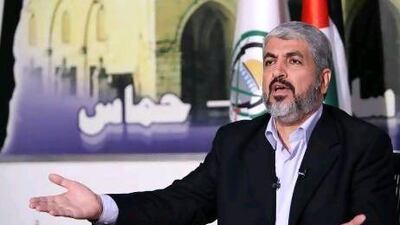GAZA CITY // Khaled Meshaal is standing for re-election to lead Hamas four months after announcing he would step down.
The decision is a setback for hardliners in the Islamist movement who have criticised Mr Meshaal's recent reforms, which include dismantling Hamas's headquarters in Damascus, reconciling with its Palestinian rival Fatah and tentatively embracing unarmed struggle against Israel.
Hamas' senior leadership refused to accept Mr Meshaal's decision in January not to seek another term as the group's Political Bureau head, sources say.
They persuaded him to remain in his post and run for re-election in an upcoming secret party ballot, the sources say.
"Meshaal is still the head of Hamas and he has majority approval from the group, from both the leaders inside Gaza and abroad," said a Hamas official in Gaza, who spoke on condition of anonymity.
Mr Meshaal agreed to stay in his job and he "is considered one of the candidates to lead the group for the election." the official said.
His continued leadership could have implications for Hamas's orientation in a region divided between strengthened Sunni Islamist parties and the revolutionary-Islamist axis of Shiite Iran and Hizbollah and the regime in Syria.
Mr Meshaal, 56, Hamas's de facto chief who has headed its Political Bureau since the mid-1990s, has tried to steer the group away from Iranian and Syrian influence.
After more than a decade in the Syrian capital, where he helped fund, plan and order attacks on Israel, Mr Meshaal last year dismantled Hamas' headquarters there because the group was angry and embarrassed about the killing of protesters by Syrian troops.
Analysts say Mr Meshaal has used the Arab Spring as a springboard to soften Hamas's image and end the international isolation imposed on it by the United States, the European Union and Israel, which classify it as a terrorist group.
While he has tried to bring Hamas closer to Muslim Brotherhood affiliates in Egypt, Tunisia and Qatar, hardliners inside the group have resisted. They see these changes as straying from Hamas's platform of resisting Israel and jeopardising ties with important allies. Tehran, a supplier of cash and, some say, weapons, is believed to have reduced its support to Hamas as punishment.
The changes also have riled officials in Gaza. Unifying with Fatah is seen as a threat to their business and political interests in the Palestinian enclave, which Hamas captured from Fatah in 2007.
The criticism of Mr Meshaal's reforms reportedly convinced him to threaten to step aside. Many considered this as a power play to sideline challengers, and this seems to have worked, said Mkhaimar Abusada, a political-science professor at Gaza's Al Azhar University.
"There was a general feeling it wasn't good to change leaders during such a difficult time in the region, and so Hamas has backed Meshaal," he said.
Mohammed Hijazi, an independent analyst and writer on political Islam in Gaza, said Egypt and especially Qatar have offered important support to Mr Meshaal and his deputy, Mousa Mohammed Abu Marzook. While competition between the rivals has intensified, the backing of such powerful supporters has helped them push issues they both endorse such as reconciling with Fatah and establishing closer relations with Muslim Brotherhood groups.
"Despite the more extreme elements in Gaza, the support Qatar has given to Meshaal and Abu Marzook has been crucial," Mr Hijazi said.
Last week, Hamas' deputy foreign minister, Ghazi Hamad, and its former deputy foreign minister, Ahmed Yousef, took part in a panel discussion held at Gaza's Al Aqsa University in support of peace negotiations with Israel. That could not have happened without a nod from a more confident Mr Meshaal, according to observers, who note the Hamas leader has sent positive signals to Tel Aviv recently.
Further, observers say the muted response inside the group to the latest Hamas-Fatah reconciliation pact signed in Cairo last month is evidence of the power of Egypt and Qatar.
The agreement resembles one signed in February in the Qatari capital between Mr Meshaal and Mahmoud Abbas, the Palestinian Authority president and Fatah's chairman.
That accord triggered howls within Hamas, especially from hardliners inside Gaza such as Mahmoud Zahar, a founding stalwart of Hamas who is rumoured to despise Mr Meshaal. They called it "unilateral" and "unconstitutional".
Days after the February agreement was signed, Hamas's prime minister in Gaza, Ismail Haniyeh, travelled to Iran on an official visit that was seen as a snub directed at Mr Meshaal.
"But after the Cairo agreement, the reaction was the opposite of what happened in Doha: there were not shouts of anger, which signals that Meshaal has indeed repositioned himself as Hamas's top leader," said Mr Abusada.
A Hamas official confirmed the group's senior leadership had recently voted in favour of supporting Mr Meshaal's reconciliation with Fatah. Last week, Hamas agreed to allow Palestinian Central Elections Commission officials to operate inside the territory. They had been banned from operating in Gaza.
"Most of Hamas is with the Cairo agreement," said the official.
He also confirmed Mr Meshaal, who now lives in Doha, agreed to stand for re-election to head the Political Bureau for another four-year term. The Islamist group has been holding internal party-wide elections over the last several months, although it was unclear when the Political Bureau would choose the group's overall leader.
Hamas keeps its internal polling process secret.
hnaylor@thenational.ae
Follow
The National
on
& Hugh Naylor on

